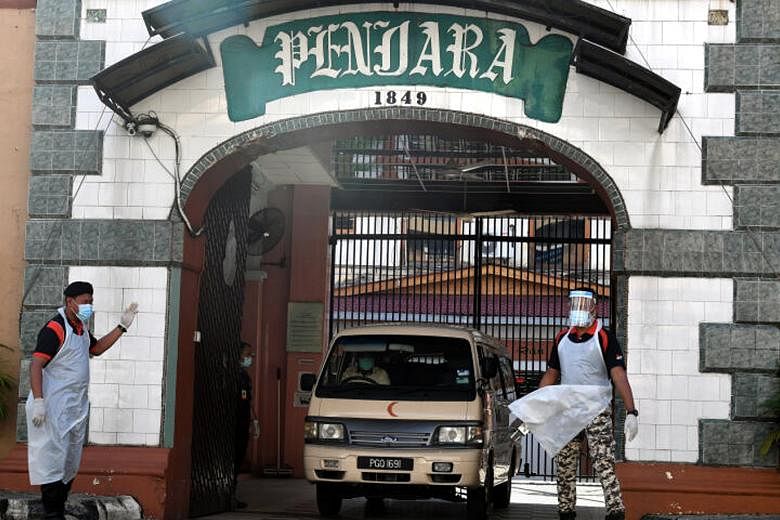When Malaysia's Prisons Department announced a plan to free selected inmates in a bid to break the Covid-19 infection chain behind bars, it gave Madam Tan Kam Chee hope that she might be able to see her son soon.
The 78-year-old said her son, in his 40s, is due to be released next month after being convicted of theft and imprisoned in Penang late last year. But the pandemic has had her worrying about his health.
"I haven't been able to sleep well. Every day, I will look for updates on the Penang prison cluster. I hope he remains in good health and will be released soon," Madam Tan told The Straits Times.
Outbreaks behind bars continue to pose a challenge for state governments, as many prisons suffer from overcrowding.
Malaysia is also in the midst of a third wave of infections, with a record high of 871 new daily cases reported yesterday, raising the country's tally to 20,498. Most of the new cases were detected in Sabah state.
One of the worst prison clusters is in the Alor Setar prison in Kedah, with at least 1,571 cases. The cluster was detected on Sept 30, following the death of a 46-year-old man who worked there. Subsequent tests discovered that the virus had spread among inmates.
A cluster in Sabah, which originated from a district police lock-up in Lahad Datu and spread to Tawau Prison, has recorded at least 1,050 cases. Another cluster at Penang Remand Prison has seen at least 399 cases and one death.
Lockdowns have been enforced at these prisons, with no movements in or out allowed.
To stop further infections and reduce crowding, director-general of prisons Zulkifli Omar on Oct 6 announced that the department will grant a release on licence, or a release with conditions, to minor offenders sentenced to less than a year of imprisonment and who had less than three months left to serve.
Opposition lawmaker Liew Chin Tong welcomed the move, saying: "These measures are crucial because the issue of overcrowding in prisons had already existed before the Covid-19 outbreak."
Mr Liew added that locking up those who had recently violated movement curbs and anti-virus measures such as mask-wearing would also worsen the overcrowding problem.
But the plan has raised concerns among the public, who fear that crime cases would rise following the release of the inmates.
Criminologist Geshina Ayu Mat Saat told The Straits Times that while desperate times may lead to desperate measures to survive, predicting what will happen is "difficult". Aside from having to compete for a job with those who have been retrenched, inmates would also need to adjust to the new norms in the outside world amid the pandemic.
"It is likely that they will go back to a life of crime - but bear in mind, the pool of potential victims will also be practising new norms; petty criminals will have less opportunities and less access to physically confront potential victims," Dr Geshina said.
"What is likely to happen is crime displacement, where crime location shifts or crime type changes due to environmental and social crime prevention strategies in previously known hot spots.
"This means increases in online fraud and commercial crime victimisation, which is already happening even without the presence of ex-inmates in our society."
Dr Geshina believes that some forms of crime that take place behind closed doors will continue - such as domestic violence, online gambling, child abuse and pornographic-related activities.
"Economic stress, dysfunctional relationships, hostile environments and adverse conditions may easily trigger violent acts, and not all the abusers are ex-inmates."
Based on the Prisons Department's records as at Oct 5, there are 11,018 inmates who have been sentenced to jail for less than one year, with less than three months left to serve. To be released on licence, they must meet strict selection criteria and pass a Covid-19 screening by the Health Ministry.
Bar Council president Salim Bashir explained that Section 43 of the Prisons Act allows detainees to be released on licence subject to rules and regulations.
He said: "The release on licence is governed by conditions imposed by the prison authorities, and any breach of that will be a separate offence. The decision is welcomed as a good move to prevent the spread of Covid 19 infections among inmates, and to minimise overcrowding in prison."
Epidemiologist Awang Bulgiba Awang Mahmud of Universiti Malaya said that from an epidemiological point of view, "it is a sound move", adding: "This will make physical distancing more doable in prisons, although I would suppose there would need to be a substantial number of prison inmates being released for this to be possible."
Professor Datuk Dr Awang said that the prisoners should first be isolated from the rest of the prison population for 14 days and tested twice during this time. "Should their two tests prove negative, then it is safe to release them," he said.
Dr Geshina hopes that those released will be adequately prepared to cope with the new norms.
She asked: "Will they be given sufficient self-protection equipment? At least until they can support themselves? If they do get infected because of their early release, what then?"











